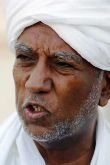Sudan says disappointed, resentful of U.N. after resolution
By Opheera McDoom
 KHARTOUM, Sept 19 (Reuters) – Sudan said on Sunday it was disappointed with a U.N. resolution that threatens sanctions if it does not stop violence in the western Darfur region, adding it was resentful of the world body.
KHARTOUM, Sept 19 (Reuters) – Sudan said on Sunday it was disappointed with a U.N. resolution that threatens sanctions if it does not stop violence in the western Darfur region, adding it was resentful of the world body.
Ibrahim Ahmed Omar, head of the ruling National Congress party, also said the U.N. should be fair and recognise the efforts of the government to solve a 19-month-old rebellion in Darfur.
“The resolution did not give adequate recognition of the efforts of the Sudanese government. Therefore one feels disappointed,” he told reporters after a meeting with President Omar Hassan al-Bashir in Khartoum.
“We are going to be resentful and we feel unhappy about the situation. The U.N. should not be a place where the U.S. can dictate.”
The U.N. says fighting in remote Darfur has displaced 1.5 million people, with more than 200,000 refugees encamped in Chad, triggering one of the world’s worst humanitarian crises.
But Omar added Sudan would accept the resolution.
“All this seems to be unfair and unjust. Of course the Sudanese government is part of the international community and part of the U.N. and it will make do with the resolution of course there is no doubt about that.”
The U.N. Security Council adopted a resolution on Saturday threatening Sudan with oil sanctions if it did not stop atrocities in Darfur, where Arab militias known as Janjaweed are accused of terrorising African villagers.
He added Sudan had suffered sanctions before and survived, and would again continue to develop if sanctions were imposed.
“Sudan has suffered sanctions too but it has also been able to continue it’s path Â?in all aspects in life and this will happen again,” he said.
Omar disputed the estimated numbers of those killed by violence, famine or disease, which the U.N. estimates could be as high as 50,000.
“There are people who died there (but) nobody has numbers for that. There is no agency which could speak the real number but we know it is very small compared with what people are saying now,” he added.
After years of skirmishes between African farmers and Arab nomads over scarce resources in arid Darfur, rebels took up arms last year, accusing Khartoum of supporting Arab militias, known as Janjaweed, to loot and burn African villagers and drive them off their land.
The Sudanese government denies any links to the Janjaweed, calling them outlaws.
